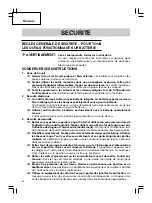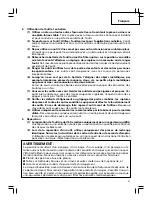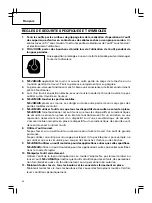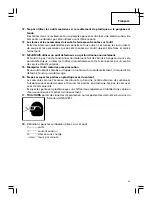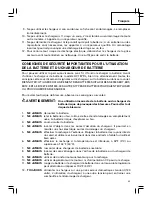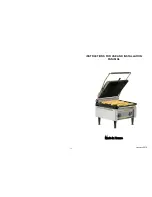
English
23
11. Confirm the cap position <DS18DL> (See Fig. 23)
The tightening torque of this unit can be adjusted
according to the cap position, at which the cap is set.
(1) When using this unit as a screwdriver, line up the
one of the numbers “1, 4, 7 ... 22” on the cap, or the
black dot, with the triangle mark on the outer body.
(2) When using this unit as a drill, line up the cap drill
mark “
” with the triangle mark on the outer body.
CAUTION:
●
The cap cannot be set between the numerals “1, 4,
7 ... 22” or the black dot.
●
Do not use with the cap numeral at “22” and the
black line at the middle of the drill mark. Doing so
may cause damage. (See Fig. 24)
12. Tightening torque adjustment
(1) Tightening torque
Tightening torque should correspond in its intensity
to the screw diameter. When too strong power is
used, the screw head may be broken or be injured.
Be sure to adjust the cap position according to the
screw diameter.
(2) Tightening torque indication (See Fig. 21 and 23)
The tightening torque differs depending on the type
of screw and the material being tightened.
The unit indicates the tightening torque with the
numbers “1, 4, 7 ... 22” on the cap, and a black dot.
The tightening torque at position “1” is the weakest
and the torque is strongest at the highest number.
(3) Adjusting the tightening torque (See Fig. 21 and 23)
Rotate the cap and line up the numbers “1, 4, 7 ...
22” on the cap, or the black dot, with the triangle
mark on the outer body. Adjust the cap in the weak
or the strong torque direction according to the
torque you need.
CAUTION:
●
The motor rotation may be locked to cease while the unit is used as drill. While operating
the driver drill, take care not to lock the motor.
●
When setting the shift knob to “HIGH” (high speed) and the position of the cap is
between “16” and “22”, it may happen that the clutch does not engaged and that the
motor is locked. In such a case, please set the shift knob to “LOW” (low speed).
●
If the motor is locked, immediately turn the power off. If the motor is locked for a
while, the motor or battery may be burnt.
●
Too long hammering may cause the screw broken due to excessive tightening.
●
A buzzing noise is produced when the motor is about to rotate; this is only a noise, not
a machine failure.
●
To extend the lifetime, the lithium-ion battery equips with the protection function to
stop the output. Therefore, when used as a drill, if the tool is overloaded, the motor
may stop. However, this is not the trouble but the result of protection function. In this
case, release the switch of tool and eliminate the causes of overloading.
Fig. 23
Drill
mark
Fig. 24
Triangle mark
Black line
Triangle mark
Cap
Drill mark






















